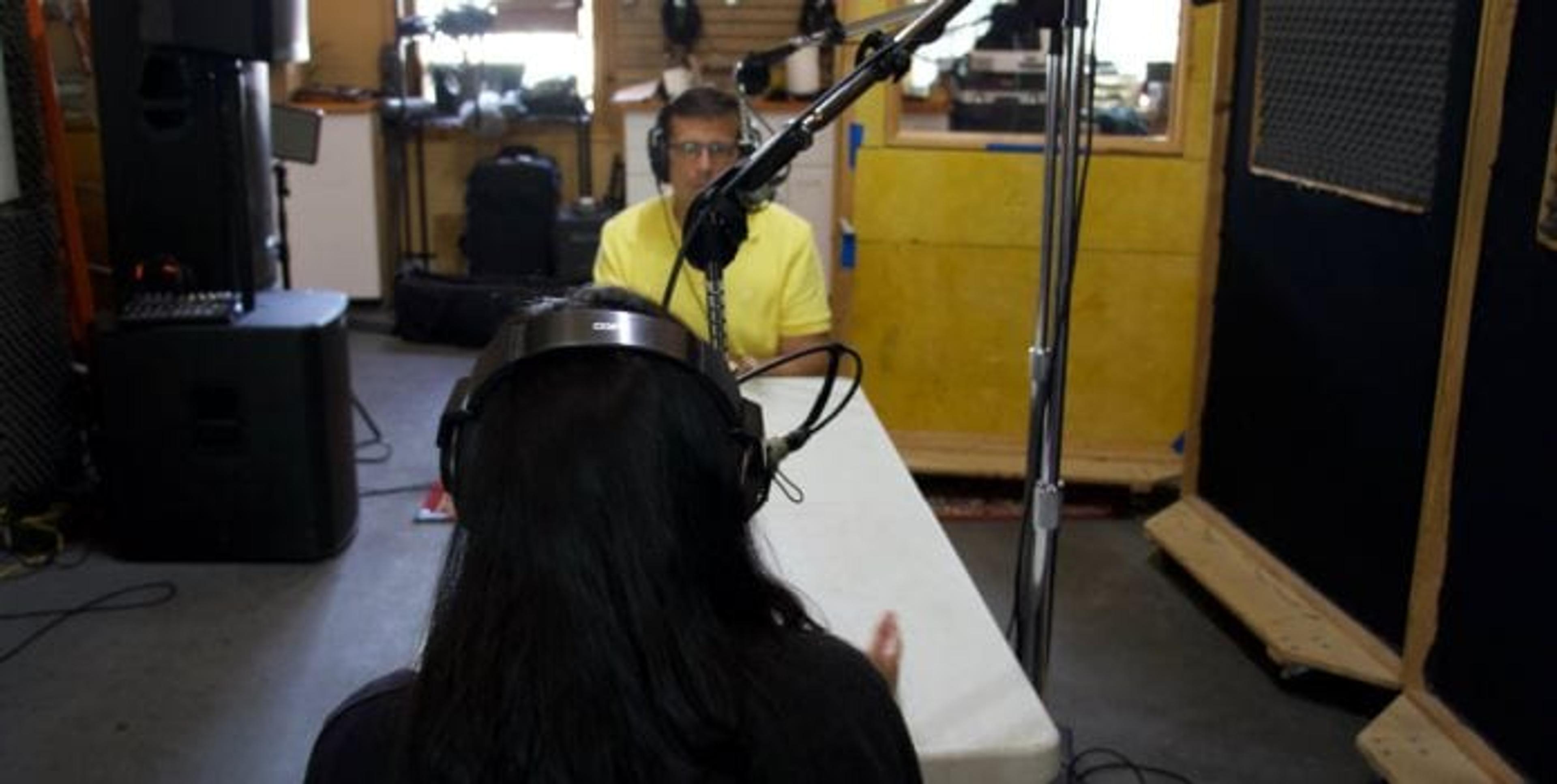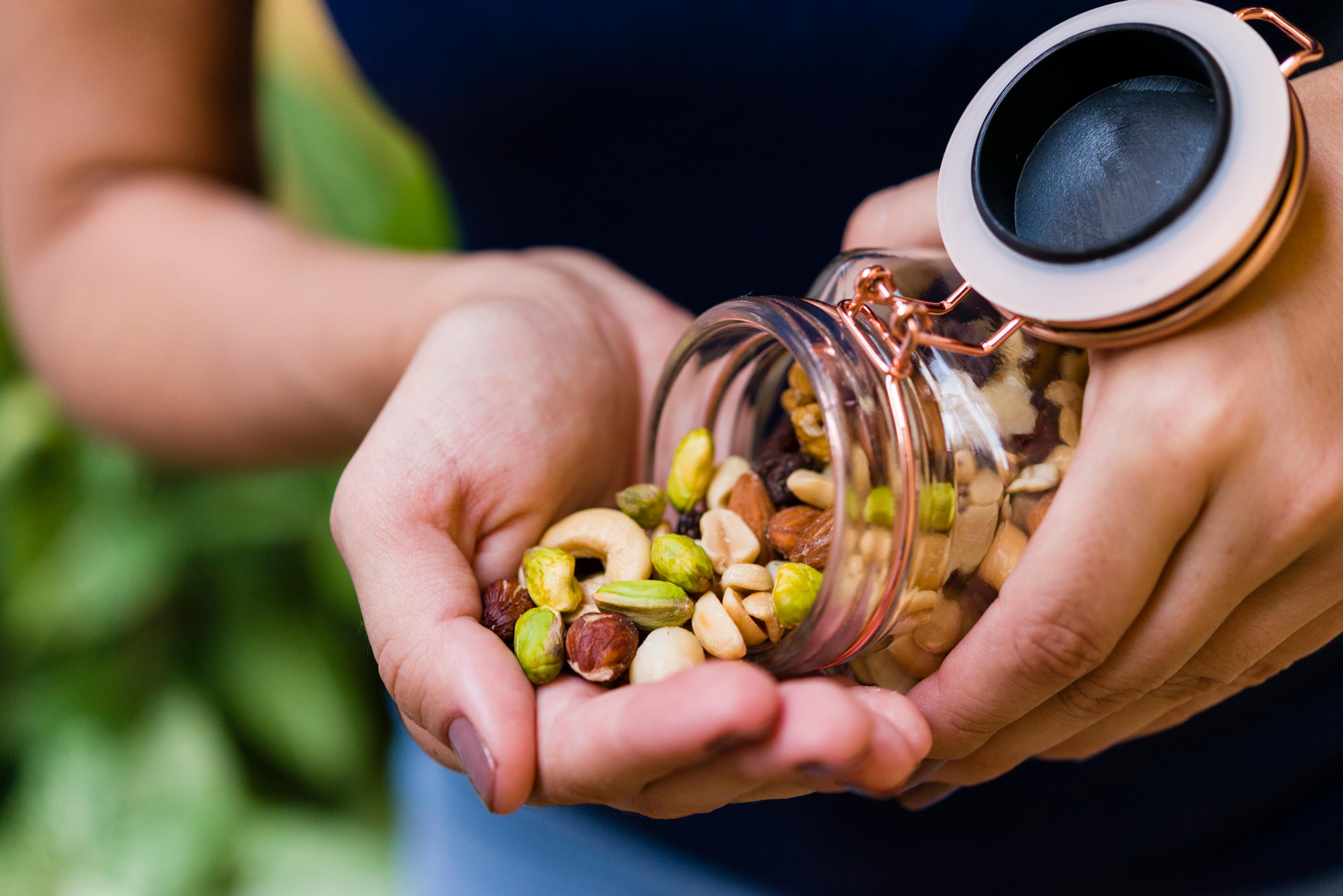Macronutrients vs. Micronutrients and the Five Food Groups
| 1 min read

00:00
00:00
About the Show
On this episode of A Healthier Michigan Podcast, we focused on how to incorporate the five food groups (fruits, vegetables, grain, dairy and meat) into your diet for optimal health.
Host Chuck Gaidica sat down with certified health coach and dietitian, Grace Derocha, from Blue Cross Blue Shield of Michigan to discuss the difference between macronutrients and micronutrients. Derocha explained that carbohydrates, fat and protein are considered macronutrients. “They are the things in food that actually give us energy and calories.” (1:44) Micronutrients include vitamins, minerals, antioxidants, water and fiber that provide healthy nutrients.
Gaidica and Derocha discussed the importance of talking to your doctor about what your diet is lacking in order to add foods that can replace vitamin supplements you might be taking. (3:15) Derocha talked about the differences in how breakfast is approached between Filipino and American cultures. She explained that embracing cultural eating styles could help people incorporate more colorful nutrition choices and fewer dessert-like foods into our daily meals.
No diet is perfect and Derocha said it’s important to strive for balance in your approach to eating. (8:53) Other tips included ways to make food fun by incorporating a rainbow of fruits and vegetables throughout the day.
Another important factor Derocha mentioned is maintaining hydration throughout your day. Fruits and vegetables can help stabilize the water intake in our body since 20 percent of hydration comes from food. (14:20) Finally, Gaidica and Derocha discussed the importance of growing your own foods, as well as how community gardens can be a healthier alternative way to secure your own produce.
___________________
Transcript
Chuck: This is A Healthier Michigan Podcast, episode two. Coming up, we discuss the difference between macronutrients and micronutrients and how do we get a healthy balance of both from the food groups?
Chuck: Welcome to A Healthier Michigan Podcast. This is dedicated to navigating a space through our health and wellbeing. We’re going to give you small, healthy habits, things that will stick that you can practice and that you can start implementing right now. I’m your host, Chuck Gaidica. Each week, we’re going to sit down with a certified health expert from Blue Cross Blue Shield of Michigan, and we’ll cover topics like we are now in nutrition. In future episodes, wellbeing, stress reduction. We’ve got the experts of the experts with us. On this episode, nothing different there. We’ll be getting into, again, macro, micro nutrients, five food groups. Did you know there were only five? Ketchup is in there somehow. It’s not its own group, right, Grace?
Chuck: Grace Derocha is back with us. She is a registered dietitian and certified health coach. She is a blogger right on A Healthier Michigan, so we’re glad of that. She’s also a certified expert with Blue Cross Blue Shield of Michigan now for several years. She is a lover of food and a lover of life, exclamation point. There you go. An MSU grad, a very proud-
Grace: Yes. Go green.
Chuck: Yes, go green and gray. How are you?
Grace: Doing well. How are you?
Chuck: Yeah, a lot of great stuff in episode one.
Grace: Yes.
Chuck: This is really rolling along. Today you’re going to give us a little science, a little something, something with numbers that we can all get our minds around the science. I don’t even know the difference between macro and micronutrients.
Grace: What’s interesting is with so many different diets out there, there’s a lot of talk of different macronutrients. Macronutrients are carbohydrates, fat and protein. They are the things in food that actually give us energy and calories. This is a quick version. Micronutrients are our vitamins and minerals, antioxidants, water, the fiber even, and those are the things that don’t necessarily give us calories but add a good nutrient dense punch to our food.
Chuck: It seems to me is, as I hear what you’re saying, vitamins, minerals, antioxidants, we used to, maybe we still can, get all of those things by just eating a little more spinach and the blueberries and the this and the darker red berries and have an apple. Now it seems like they’re special water I’ve got to get, and I’ve got to have the vitamins that I’m buying. Do we need to concentrate that much on the micronutrients as supplemental or can we start to adjust our diets to help us out?
Grace: I’m glad you brought that up. Supplements, vitamin supplements, mineral supplements are called supplements because they would be supplementing the diet. I realize no one eats perfectly, right?
Chuck: Yeah.
Grace: You might need a little help in certain areas. I think vitamin D is a good example of that because vitamin D, most of that we get from the sun and there’s not as many foods that have it.
Chuck: Going for a good healthy walk on a day like this that we’re recording is a great idea.
Grace: Exactly, because our bodies can make that vitamin D then from the sun, but we just know that a lot of people are lacking in their vitamin D, so that might be a supplement you need. Again, you should see your doctor to figure out what you might be lacking in, and then maybe adding some of those dense foods with all that nutrition into your diet so you might not need to take the vitamin supplement pill.
Chuck: I think back to my grandfather on my mom’s side and every single sit-down dinner we ever had at his house. His salad would today look like a picture on the cover of a magazine because he had fresh radishes from in the yard.
Grace: Yes, love that.
Chuck: He had peppers from in the yard and leaf lettuce. I would look at his salad and I think back and I thought, I don’t even know anybody who eats a radish anymore. I don’t go out of my way. Do you?
Grace: Yes. I love radishes.
Chuck: See, that stuff that he would just do intuitively or that’s the way he was brought up, he was getting a lot more stuff sometimes than we get today.
Grace: It’s so funny that you bring that up. I’m Filipino, and my parents came here from the Philippines. I was born and raised here. When I was a kid, for breakfast, and my mom to this day still doesn’t understand, she’s like, “In America, it’s dessert breakfast,” but I used to have rice, brown rice, even white rice sometimes, but sometimes some fish or pickled vegetables as my breakfast. When I was young, I didn’t know any better. I was like, “This is great.” Talk about being fueled for the day as a child. Now, you see muffins and donuts and pancakes and waffles.
Chuck: Box of cereal, yeah.
Grace: Box of cereal, yeah, all of these sweet almost treats. It’s just funny how we could learn so much from different cultures about how to get a lot of colorful food into our diet.
Chuck: Are you saying your Filipino upbringing then, the notion that you were balancing, am I getting this right, macronutrients, the protein, the carbs, I guess it’s fat even but good fat in the fish?
Grace: The fish, yeah.
Chuck: That’s part of the key of how to go through our day.
Grace: Yes, absolutely. I think what is confusing to a lot of people is that we have food groups and then we have macro and micronutrients. Most food groups have almost every macronutrient in it. If you think about vegetables have obviously vitamins and minerals from the micronutrient side, have a little bit of carbs, even if they’re non-starchy. There’s a little bit of carbohydrate there. Sometimes there’s a little bit of protein, not usually fat. Grains, for example, even your whole grains have carbohydrates. Your beans and legumes which have carbohydrates and heart healthy fat and protein.
Chuck: Black beans is filled with protein.
Grace: Yeah, chickpeas on my salad, whatever it might be. Those plant-based proteins also have some carbohydrates and some heart healthy fat.
Chuck: Give me, what are the five food groups as we know them, because fruit rollups I don’t think are the top of the list, right?
Grace: Unfortunately, no.
Chuck: Little donut holes. I’m sorry. I’m just saying.
Grace: We have fruits. We have vegetables. We have grains, dairy, and then people would say meat or protein.
Chuck: When we look at that, we hear all kinds of stuff. Over time, you’ll see the craziest study that comes out that just last month, there was some other study that said we should eat more beef, and then this month, there’s another study that says watch out for heart health. How do we find balance in our lives where everybody seems to have … Maybe they’re not trying to spin it for their own use. If it comes from the cattle producers, I understand why we need more beef. If it’s just coming out, how do we balance our lives and go through this world without having someone like you over for dinner every night to help us?
Grace: I know. My friends always … I get texts all the time.
Chuck: Do you really?
Grace: Oh yeah, with tons of different questions about, I just read this study about beef, or about, what was the one a friend sent me? It was about vitamin D, just asking questions because it can be confusing. I’m glad you brought that up. I feel like research studies, you have to see who did the research study? If it was ever replicated to get similar results. There’s seven different pillars of research. We’re smart, at least we like to be smart human beings. Being smart about what you’re reading and how it might be spun or be clickbait-y, whether it’s on the internet. That’s one thing. I always tell people. People tell me, “I googled whatever and now I know everything.”
Chuck: Well, yeah, because we’re all google doctors somehow. Be careful about that or you’ll have some strange, wacky thing. Take me through your day because I wonder about the example. You are brought up with this cultural influence on your breakfast. What has shifted for you and how are you now moving through your day? What would be a good example of balance with the five food groups and the macro and micronutrients that would just give us a little example?
Grace: Yeah. It’s funny. On the way here, which I said don’t eat in the car but I wanted to make sure I got here on time, I had a quinoa egg bake. It’s a recipe that I made up.
Chuck: Oh, so you made it. You didn’t get it at Panera or somewhere?
Grace: No. I made it, but what I did is I made a big batch of it. This is the last couple of pieces my husband and I had today for breakfast because I made it on Sunday. It had eggs in it. It had some cheese. I had spinach, tomatoes, green onion.
Chuck: Wow. Can we carpool? That sounds really good.
Grace: The best part about this recipe, I’m giving myself a shout out so people should check it out on A Healthier Michigan, is that-
Chuck: We’ll post it, right?
Grace: You don’t have to cook the quinoa ahead of time. The quinoa cooks when you bake the whole thing. You’re getting your whole grains. I’m getting protein from the eggs. I did put some cheese in there and then I put vegetables in.
Chuck: It is important to have that balance with protein. If you’re just going for the bagel or just toast and quick got to put a little butter on it and go, well, where’s the protein to balance that out?
Grace: Yeah. I would say, let’s say you didn’t have time and you did want the bagel, then maybe make a conscious effort then at lunch to get some protein in and some vegetables in or whatever it might be, because we can’t be perfect. It was actually good that you asked me that today because I did have a really solid, good, perfect breakfast.
Chuck: I didn’t catch you with … Yeah. For lunch and dinner, are you sort of planning your life the same way? Because you’re an inspiration to me so I’m sure to others as well who are listening.
Grace: Yes. We’re going to definitely extensively talk about meal planning, but I do like to meal plan. I think one of the things is I do think about food all the time, so I’m always thinking-
Chuck: It’s your job, right?
Grace: I know.
Chuck: For me, it’s just a dysfunctional thing. I deal with it. I’m trying to get past the diet to the lifestyle change. We talked about that in episode one. It’s not just a diet you start and then I’m going to end it in a week because it really … Especially if you struggle with that notion, you’ve got to make this part of your lifestyle.
Grace: Yeah. I think if people take a step back to look at the different food groups and where they’re getting more of certain things and less of others, how to incorporate that. I know we play this game at my home, eat the rainbow. It’s almost a competition between my husband and I, and the kids are in it now. Who can eat the most colors that day because those vitamins-
Chuck: Not just at one sitting. You mean through the day.
Grace: No. Those vitamins, those minerals, those antioxidants. You cannot get antioxidants except in the fruit and vegetables and whole grains itself. That doesn’t come in a supplemental pill.
Chuck: That’s great. That’s a great game for the kids. With a three and a half and a six-year-old, that’s fun.
Grace: Yes. Even though my husband tries to steal the blueberries all the time. He does. Chuck, he’ll text me, he’ll be like, “Did you get any blue in today?”
Chuck: There isn’t any left?
Grace: I’m like, “No, because you took the whole thing.”
Chuck: When we hear this idea of other diets, heavy on protein, heavy on carbs, what I’m hearing you say maybe without even saying it is that the balance is just as important through your day and these macronutrients. Am I right?
Grace: Yes, absolutely. I think what people need to look at too is do they feel satisfied? I just looked at … A girl sent me a food log the other day, and she’s on a diet, but the diet that she’s on doesn’t allow her to have fruits and vegetables. We can talk about that a little bit more, but she’s on a ketogenic diet. I know we’re going to dive into that I think in the next episode. I’m literally looking at this, Chuck. She’s eating like almost 3,000 calories a day because she has so much fat in her diet. The first thing I asked her is, “How do you feel?” She said, “Well, I feel like I’m losing weight.” I said, “No, but how do you feel?” She’s like, “In the summer right now, I just want some watermelon.” I was like, “Then have some watermelon.”
Chuck: You know, it does work for that. For some people, I’ve seen it work, and then I don’t know what happens after I’ve seen it work. I used to hang out with a guy, I worked with a guy who one day, all I saw him eating were Slim Jims, all day. I said, “What are you doing?” “Oh, I’m on a diet like that, and I’m taking off pounds.” I never saw the after, like when he stopped, what the spring back could have been the day he went and said, “I need a potato.”
Grace: Right, exactly. I need a slice of whole wheat bread. Yeah.
Chuck: How do we look at this other idea? Any other practical tips we can … news you can use for all of us who are just trying to get through our days with this idea of balancing macro and micronutrients and the five food groups.
Grace: I would tell people, if you’re not choosing whole foods, which obviously in a perfect world we’re eating whole foods all the time and not having to read a food label, if you are having something where you need to read a food label, be conscious of the serving size and what the impact of that food label actually means. If you’re having a can of soup and it might say one serving is half a cup, but there is four servings in this can of soup. Be very aware of what the impact of that could be.
Chuck: I’m using an app now, so I actually have, outside of my wife who is the boss of me, I’ll just say it. I have something I’m now responsible to. I really am tracking. It’s got a scanner, so I just go to the barcode, bada-bing bada-boom. It’s telling me most of the time it’s not off what it is.
Grace: Yeah. I love those apps. I love the accountability and the insight it can give you on your day because a lot of people don’t realize I’m low on heart healthy fat or I’m low in fiber. Maybe that’s why I’m not regular. Maybe that’s why my stomach is hurting.
Chuck: Interesting. It sends me little notes. I’ll get this little message. It’s like a push notification. I’ve noticed, like it’s actually a person. I’ve noticed that the days you eat bananas, you tend to stay truer to your plan. How did you know that?
Grace: Isn’t that funny?
Chuck: Well, it’s just looking at the history of the past seven, eight months.
Grace: I love that it’s calling you out.
Chuck: Well, it is. Yeah. You know what? It does do that. It will say you didn’t register your breakfast this morning. I’m like, “Oh yeah, I need to do that.”
Grace: I think another important part of the vitamins and minerals in our fruits and vegetables and micronutrients, and we’ve talked about this too, we talked about this off air, is being hydrated and avoiding dehydration. When it comes to being hydrated, 80 percent of that is supposed to come from water and our liquids that we drink, but 20 percent of that comes from food. Because our produce that we’re consuming has a lot of minerals that can help stabilize what that looks like as far as hydration goes in our body and help combat different things, if we’re getting too much sodium or not enough sodium, allowing that to happen. Having those fruits and vegetables to help with hydration for young kids and for seniors and … Well, for all of us, really.
Chuck: Yeah. Do we have to get special water? Outside of the fact that you want it to be filtered. Maybe you have a thing in your fridge or maybe you’ve got something else that helps you with that process. Short of that, do I need to have vitamins or minerals or other essentials in my water or just water?
Grace: No, because, again, it’s coming back to being a supplement. If you are eating your fruits and vegetables, they say at least five a day but we know with research, it shows if you’re getting closer to nine servings a day, you are fighting off chronic conditions like type two diabetes, hypertension, cancers.
Chuck: As we still hold on to some warm weather, is it possible that you can have any more fun than going to your local farmer’s market? If you’ve never gotten into it, just take the step. It’s not just for the cool or the trendy or the farmers. It’s really fun to just walk around and see this stuff and look at the colors. You’re talking about the rainbow. It’s all there.
Grace: Yes. I feel like farmers can provide so much information to us about how to start our own garden. I had to talk to one about making sure the deer wasn’t eating all my zucchini.
Chuck: Are you growing stuff?
Grace: Oh yeah.
Chuck: Yeah. What do you grow?
Grace: We have zucchini. We have eggplant. We have bell peppers. We have lots of herbs. I have butternut squash, garlic. I think I’m missing something, spinach… tomatoes. Duh.
Chuck: My sister and brother-in-law don’t have the kind of yard that they would want to grow. They’re in Livonia. I didn’t know this. 8 Mile and Farmington or 8 Mile and Middlebelt. There’s a plot of land that belongs to the city, and I think it’s like 30 bucks a year, and he gets the entire garden for himself and then he’s able to work it and there are a bunch of other people. They have this little group meeting and they exchange produce. I thought, what a brilliant idea.
Grace: Yeah, community gardens. It’s funny because in Europe, I think it’s Sweden, what people do is they talk to their neighbors. They check the pH of their soil to see what would best grow in their garden, and then grow only all of that. Everyone has their own and then they share, swap.
Chuck: Interesting. Very cool.
Grace: Isn’t that amazing? If only.
Chuck: Yeah. Well, I’m inspired, and I like zucchini. I’m just saying. Maybe for the next episode, Grace, I’m just planting a seed. Get it? Listen. We’re glad you’re with us. This is A Healthier Michigan Podcast brought to you by Blue Cross Blue Shield of Michigan. If you like the show, you want to know more, Grace is going to be posting things right here as well. Here comes the web domain. It’s ahealthiermichigan.org/podcast. You can leave us a review or a rating on iTunes or Stitcher. You can get all the episodes on your smartphone or on your tablet, and you can subscribe to us if you’d like on Apple Podcasts, your favorite podcast app, go back to Stitcher. Join us next week.
Chuck: We’ll continue this conversation with Grace, and we’re going to talk about something that we, actually in first episode and even the second episode, we’ve talked about a bit, why diet? Maybe it’s just the word, but why diets don’t seem to work? You relate to that? We’ll see you next time.





